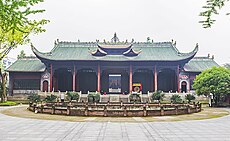| Qianwei Confucius Temple | |
|---|---|
| 犍为文庙 | |
 | |
| Religion | |
| Affiliation | Confucianism |
| Location | |
| Location | 297 South Street, Yujin Town |
Qianwei Confucius Temple (simplified Chinese: 犍为文庙; traditional Chinese: 犍為文廟), or Qianwei Confucian Temple, is a Confucian temple located at No. 297 South Street, Yujin Town, Qianwei County, Leshan City, Sichuan Province.
Qianwei Confucius Temple is the largest Confucian temple in Sichuan, it covers an area of 43,333 square meters.
History
Qianwei Confucius Temple was built during the Xiangfu periods of Emperor Zhenzong of the Northern Song dynasty (1008–1016), and has been rebuilt three times, relocated three times, and repaired twelve times during the Song, Yuan, Ming, and Qing dynasties and the Republic of China for more than 900 years.
Conservation
In 2006, Qianwei Confucius Temple was listed as the sixth batch of Major Historical and Cultural Site Protected at the National Level in China.
References
- "50 rural tourism routes in Sichuan". People's Daily. 2020-04-01.
- "How can you ignore these monuments when you come to Leshan to run a marathon". Xinhuanet.com. Oct 25, 2017.
- "Focus on the appearance of all beings in the college entrance examination: candidates worship Buddha and pray for luck, wear champion underwear". People's Daily. 2013-06-07.
- "Qianwei Confucian Temple_Travel Channel_Sina.com". Sina. Retrieved 10 March 2021.
- ""Past and Present" of Qianwei Confucian Temple". China News Service. 2012-10-24.
- "Qianwei Confucian Temple is open to all people for free". Sichuan Daily. 2021-01-21.
- "Qianwei Confucian Temple: A magnificent building built by the rich "Jin Qianwei"". Huaxi City Daily. 2016-01-23.
- "Attractions in Leshan". Xinhuanet.com. Apr 24, 2017.
- "Introduction of Yujin Town". www.qianwei.gov.cn. 2020-09-18.
This article about a Chinese religious building or structure is a stub. You can help Misplaced Pages by expanding it. |